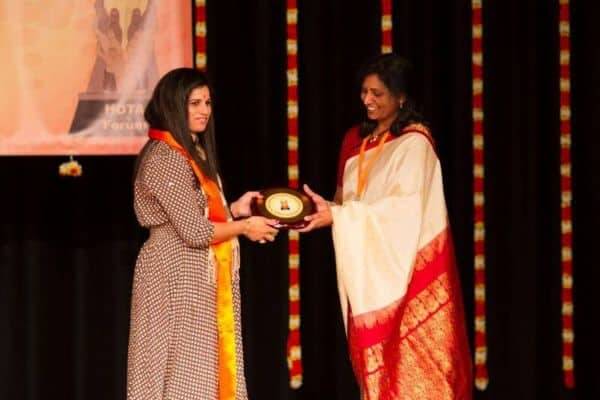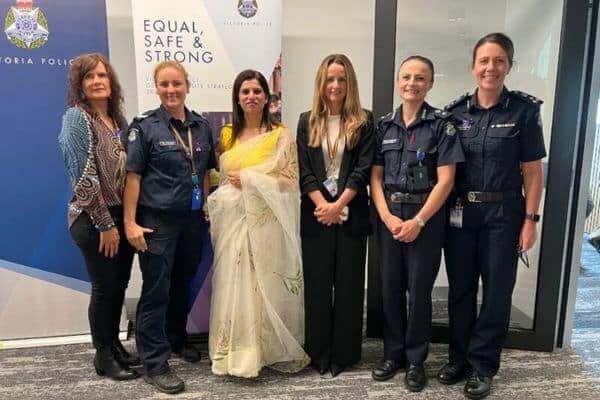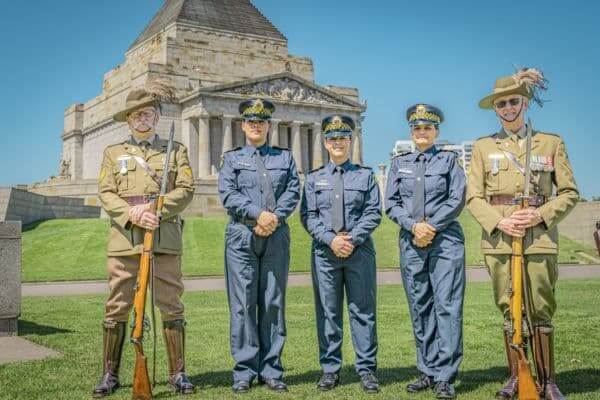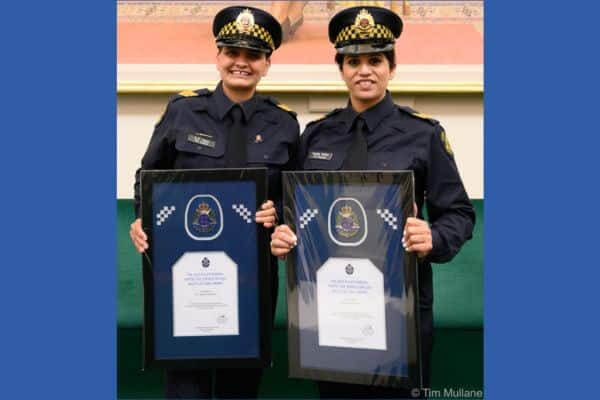Indian mums in their 40s aren’t exactly what first comes to mind when thinking about a police sergeant. But look a bit deeper at Simarpal Kaur and Pushp Sidhu, and you’ll see the courage and tenacity that make them exceptional members of the Victoria Police force.
As Protective Service Officers (PSOs), they’re redefining what it means to ‘Uphold the Right’, bridging the gap between the Indian community and the police, and challenging racial and gender expectations through their work.
From unlikely recruits to award winners
It was only a matter of time before Simarpal (Simmi) Kaur applied for a position within the police force.
Arriving in 2007 with her family as a Masters student at the University of Rockhampton, she soon relocated to Melbourne so her son could be closer to the Punjabi community. It was during her time working at Woolworths in Cobram when she first saw an ad for the Victoria Police.

‘Policing was always in my blood. My brother and uncles were all in the Indian Armed Force, so I signed up,” Kaur says.
Policing wasn’t quite front of mind for Pushp Sidhu, however, despite also having relatives in the Indian Army.
“I never thought I would join the police when I was at university in Chandigarh,” Sidhu says. “[But] I was doing sports and was an outgoing person, confident.”
Moving to Melbourne with her husband in 2010, she soon found herself helping women in her area to escape family violence, experiences that helped her realise she was destined for a career in Victoria Police.
“I was a temporary resident, and people told me, it’s going to affect your visa application if you go to court and help them. I said, this is humanity [sic], this is something wrong, I need to stand up,” Sidhu remembers.
Of course, the job application was just the beginning of their journey, and they both had to overcome both physical and social challenges; Kaur even had to learn to swim. Fortunately, they had the backing of their families – Sidhu’s husband even joined the force after her.

“I’m from a village in Punjab, and my dad gave me all the freedom. But when I came here, the people around me weren’t so open minded, especially my friends – they were shocked, and said the role wasn’t safe, it would be like India and I wouldn’t be treated well,” Kaur remarks.
“My husband supported me…I wasn’t that fit, and the beep test requirement was 6.10. He took me to the [sports] grounds every evening and we practiced it, and he taught me how to do push ups…”
These days, their stories are celebrated by the community around them, many of whom have been inspired to also join the police. As winners of the Police Annual Protective Service Officer Multicultural Award at the 2023 Victorian Multicultural Commissions’ Awards for Excellence, they’ve become celebrities amongst their networks.
“It was a very special moment. After that, I think we were so famous together, on Vic Police media – wherever we go they say ‘these girls are the famous girls’. The hard work we did paid off, and this encourages us to get into even more community engagement,” says Kaur.
Shifting community perception
For PSOs Simarpal Kaur and Pushp Sidhu, being Indian women in the force helps them to tackle crucial issues like domestic violence from a grassroots level and in a culturally informed way. Simarpal Kaur has organised many events at the Hoppers Crossing Gurudwara Sahib, educating her community on family violence, mental health and crime prevention. Pushp Sidhu works closely with the Sikh and Hindu communities on career and skill programs.
Equally, their work on the beat helps to change the wider community’s perception of Indians.
“In Australia, some people are not aware about the Kirpan. I had one incident in Footscray where it was raining, and a guy had to take off his shirt because it was wet, and he had Kirpan. People were screaming because they saw the knife…I was there so I explained to the supervisor and the people. I add this in my presentation as well, so people are aware of Kirpan,” Sidhu says.

However, the CALD community’s perception of the police is fraught. Accusations of systematic bias and racial profiling were heightened during the pandemic, with an inquiry pointing towards disproportionate policing of public health orders amongst multicultural areas.
Additionally, distrust for police persists amongst the Indian community due to prior associations with the corruption and brutality issues plaguing policing in India.
The recruitment of CALD PSOs, coupled with community outreach programs and initiatives such as the Diversity Recruitment program aim to tackle these beliefs and rebuild trust in the police as an institution to serve all.
“It used to be [the Indian community] go away from the uniform… I think there’s a lot more respect of the force now…When I [do presentations in] the temple, the parents say to the kids ‘if you do something bad, this aunty will catch you’. I say don’t do that – teach them that we are friends…if you child is lost in a shopping centre, instead of running from the police, they should come to us,” says Kaur.
‘Policing is in our blood’
If you’ve ever travelled on a train in Melbourne after dark, you’ve probably seen a Protective Service Officer (PSO) on the platform. Responsible for low-level policing, they also provide security at courts and major events, and ceremonial support at government institutions such as the Shrine of Remembrance and Government House.
Though the wider police force still have some way to go in reflecting the diversity of the communities they serve, PSO statistics are promising; in 2019, 38 percent of all PSOs (roughly 1400) were born overseas. PSO Simarpal Kaur says the Indian community make up a sizable portion of these recruits.
“Whatever [area] cluster you go to, you can see [Indians] working together…when I was a transit PSO, it was me and two other Indian boys, and we would talk in our own language sometimes,” she says.
Perhaps it could be the values of service embedded within culture which attract Indian recruits to the police.

“This is in our blood. It’s not just because we joined the police we [help], but we like doing that, and they are also the values of Victoria Police…wearing a uniform gives us pride and the opportunity to help someone,” says Pushp Sidhu.
Of course, being Indian women in the force is unfortunately not without its challenges as well.
“It’s normal, you get disrespectful people. Not racism every day, but you do get people like that, who don’t want to talk to a female, or to an Indian, or make comments on our accents – we don’t care. They don’t know us personally,” says Kaur.
“When we need to arrest them, or they’ve done something wrong and they’re grumpy, [sometimes] they can’t find anything else to say so they use this. I don’t get upset at these things – they teach us that they’re throwing it on your uniform, not on us personally. We maintain professionalism,” says Sidhu.
But for Kaur and Sidhu, such instances are outweighed by the opportunity to help those around them.
“Helping community is my favourite thing – this is why I joined. It gives me strength and happiness when I go to work and someone is in need, and I can help them, and they feel better. Sometimes they even remember me [because] I helped them. It gives me [the] strength to do more community engagement events,” says Sidhu.





